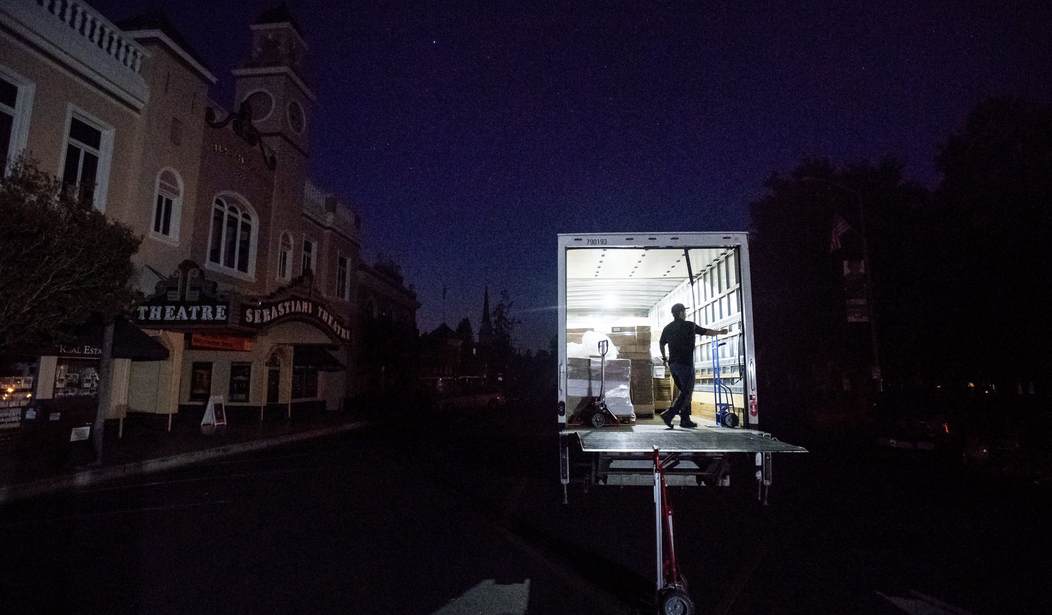All is not well on the West Coast. Pacific Gas and Electric (PG&E), California’s main supplier of power, is shutting off the grid for nearly a million Californians. This, they say, is necessary because of the high winds and peak conditions for wildfires over the next few days.
Pacific Gas and Electric said power was shut off to 513,000 Northern California homes and businesses early Wednesday. Another 234,000 Pacific Gas and Electric customers will lose power at noon local time, and 42,000 customers in the southernmost areas of the company’s reach could also go dark, the state’s largest power company said.
The precautionary shutdown is expected to last through most of Thursday, and some areas could be without power longer as the utility ramps back up after the winds abate.
PG&E equipment was blamed for last year’s deadly Camp Fire wildfires.
There doesn’t seem to be any easy solution to the yearly wildfire season, and California policy has always seemed to work in opposition to fire safety. Environmentalists have, for decades, fought the clearing of underbrush that serves as fuel for these raging fires. Instead of doing basic maintenance, almost one million people will have to live without power. No one is ready for it.
The San Francisco Chronicle is reporting that people are stocking up on liquor and few of them have safety readiness kits. One resident they spoke to said she “knew she was woefully unprepared for days without power. Despite living along an earthquake fault and within a half block of where the 1991 Oakland conflagration destroyed the whole neighborhood, Weld didn’t have a comprehensive emergency kit ready to go.”
Californians are also pretty concerned about what the heck they’ll do for entertainment. The unprepared woman told the Chronicle, “What did I used to do (before the Internet)? Board games, reading books, writing by hand?” Sounds horrific.
A liquor store worker, Paul Vasconcelos, told the Chronicle, “People are loading up on ice and water and booze. They’re going a little crazy, know what I mean?”
Well, if you don’t have a first aid kit in the middle of one of the most volatile places in the United States, then you might as well get drunk as you die in a stupid accident that could have been avoided with some basic safety preparation.
This only solidifies my theory that the worst terror threat or natural disaster that could happen to America is a hit to our power grid. I would bet that 80 to 90 percent of all city-dwellers would die rather quickly. These are mostly people whose only skill is crushing it on Fortnite. Caring for themselves and surviving the brutality of nature without buttons that make things happen is way out of their wheelhouse. That doesn’t have much to do with anything except to serve as a public service reminder that every human being should have basic survival skills. Earth is a dangerous place. Maybe instead of teaching fifth-graders every possible conglomeration of sex positions in California, they should teach them how to survive a power outage, since this seems to be a thing that the state is going to inflict on unwilling people from now on.
The emergency shut-offs came into being in 2018 after PG&E was blamed for starting wildfires that had devastating consequences. One wonders if the executives at the power company ever thought of the devastating consequences that will happen to almost one million people without power. It isn’t just the millennial dolts, who will most likely be okay, that will suffer. What about the elderly or anyone who relies on medical equipment that must be plugged in? What about the businesses that will lose all their inventory?
A utility like PG&E is mandated to provide power because doing so isn’t just a matter of modern conveniences—it can be a matter of life and death. That’s especially true in the Golden State’s mountain towns that are most at risk of catastrophic wildfire, many of which are retirement communities. The elderly may rely more heavily on medical appliances, and be more vulnerable to heatstroke without air conditioning. By preemptively cutting off power, you’re also potentially cutting off communication—if the power goes out and a wildfire starts, and TVs and internet routers don’t work, people could be at risk. Electric water pumps too would go offline, potentially hampering firefighting efforts.
That doesn’t sound good.
The green folks are pretty angry about it too. Imagine how upsetting it is to find out that the tens of thousands of dollars you spent on solar panels will not help you one bit. According to the Chronicle, solar systems are also hooked into the grid. The only way anyone with a solar system would have power is if they had an onsite battery that had been storing it and even that wouldn’t last very long.
Even experts like Daniel Swain, a scientist at UCLA, aren’t sure about PG&E’s plan. “Even if you prevent 90 percent of wildfire ignitions, the remaining fires could be just as bad or even worse,” Swain told Wired. “That still leaves us with the problem that the character and intensity of wildfires are changing. Even if we see fewer of them, we’ll still have catastrophic fires.”
In an effort to preempt catastrophic wildfires, PG&E is creating catastrophic power outages. Does anyone else see the problem here?
Megan Fox is the author of “Believe Evidence; The Death of Due Process from Salome to #MeToo.” Follow on Twitter @MeganFoxWriter










Join the conversation as a VIP Member